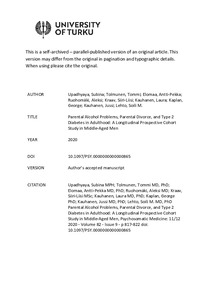Parental Alcohol Problems, Parental Divorce, and Type 2 Diabetes in Adulthood: A Longitudinal Prospective Cohort Study in Middle-Aged Men
Upadhyaya Subina; Tolmunen Tommi; Elomaa Antti-Pekka; Ruohomäki Aleksi; Kraav Siiri-Liisi; Kauhanen Laura; Kaplan George; Kauhanen Jussi; Lehto Soili M
Parental Alcohol Problems, Parental Divorce, and Type 2 Diabetes in Adulthood: A Longitudinal Prospective Cohort Study in Middle-Aged Men
Upadhyaya Subina
Tolmunen Tommi
Elomaa Antti-Pekka
Ruohomäki Aleksi
Kraav Siiri-Liisi
Kauhanen Laura
Kaplan George
Kauhanen Jussi
Lehto Soili M
LIPPINCOTT WILLIAMS & WILKINS
Julkaisun pysyvä osoite on:
https://urn.fi/URN:NBN:fi-fe2021042821588
https://urn.fi/URN:NBN:fi-fe2021042821588
Tiivistelmä
Objective
Type 2 diabetes is a chronic disease and a serious global public health concern increasing both mortality and morbidity. Previous studies have found evidence for an association between early psychological stress and diabetes later in life.
Methods
This study examined the association between parental alcohol problems and parental divorce and the incidence of type 2 diabetes in Finnish men aged 42 to 61 years (n = 754) in a prospective setting. Information on parental alcohol problems and parental divorce was derived from school records and subjective experiences of the same events from self-rated questionnaires. The average follow-up time for the participants until the first type 2 diabetes diagnosis was 23.3 years (25th-75th percentile, 21.2-27.9 years).
Results
Cox regression analyses revealed that parental alcohol problems (hazard ratio = 3.09, 95% confidence interval = 1.38-6.88) were associated with an increased risk of type 2 diabetes during the follow-up, even after adjustment for age, marital status, education, Human Population Laboratory Depression Scale scores, smoking, alcohol consumption, body mass index, and serum high-sensitivity C-reactive protein. In a similar model, parental divorce (hazard ratio = 1.69, 95% confidence interval = 0.40-7.05) was not associated with an increased risk of type 2 diabetes during the follow-up.
Conclusions
Our findings suggest that not all adverse childhood experiences contribute equally to the risk of type 2 diabetes. Parental alcohol problems, but not parental divorce, were associated with an increased risk of type 2 diabetes in men. These findings highlight the need for early interventions targeting parents with excessive alcohol consumption to reduce their offspring's risk of life-style-related disorders.
Kokoelmat
- Rinnakkaistallenteet [29337]
